Tajik Beverages: Basic Overview
Common Ingredients
Common Preparing Methods
Drinking Etiquette
Influence and Fusion
Tajik Beverages: Origin and Region
Cuisine
Culinary Region
Classifications of Tajik Beverages
-
Alcoholic Beverages
Alcoholic beverages in Tajikistan include vodka, beer, and wine. These beverages are commonly paired with traditional Tajik dishes.
-
Non-alcoholic Beverages
Non-alcoholic beverages in Tajikistan, including tea, milk-based drinks, and juices, are a vital part of the country’s culture and hospitality.
Tea, especially green tea, is the most common and is enjoyed year-round. It is traditionally served in small ceramic bowls called pialas and is an essential part of social gatherings.
Tajik beverages reflect Tajikistan’s rich culture and diverse geography. They are influenced by Persian, Russian, and Central Asian culinary traditions.
Popular non-alcoholic drinks include green and black tea, often served with sugar or sweets. Kefir, a fermented milk drink, highlights the importance of dairy.
Alcoholic beverages are less common due to cultural and religious norms, but vodka, influenced by the Soviet era, is sometimes consumed on special occasions.
The flavors of Tajik beverages are a delightful mix, from sweet and tangy to mild and refreshing, all crafted with local ingredients and traditional methods like fermentation and brewing.
In this article, you’ll find a curated list of common Tajik drinks. I’ll also share tips on how to match them with Tajik dishes.
Let’s begin!
11 Best Tajik Beverages
Here are 11 of the best Tajik drinks, including both alcoholic and non-alcoholic options. Feel free to use the filter function to make your reading easier.
Green Tea
- Non-Alcoholic
- National
- Traditional
Green tea is a national beverage in Tajik cuisine, known for its light, refreshing taste, and subtle vegetal notes. It has a slightly astringent texture that leaves a clean finish.
Enjoyed throughout the day, whether at breakfast, lunch, dinner, or anytime a soothing drink is desired. Green tea is consumed year-round, especially during colder months and Navruz (Persian New Year), for its warming qualities.
Green tea is popular in neighboring countries like Uzbekistan and Kyrgyzstan.
Black Tea
- Non-Alcoholic
- Traditional
Black tea, or “choy” in Tajik, is a traditional beverage cherished for its robust, bold flavor and deep amber color. It offers a full-bodied experience with rich notes of malt and honey and a smooth texture.
While variations like milk tea or spiced tea exist, basic black tea remains the most popular.
Widely enjoyed in Tajikistan and across Central Asia and the Middle East, black tea is served anytime, breakfast, lunch, dinner, or afternoon breaks, and is favored during cooler months for its warmth and strength.
Black tea is integral to Tajik social life and is frequently served during celebrations and cultural festivals like Navruz, often accompanied by traditional sweets and snacks.
Shirchay
- Non-Alcoholic
- Traditional
Shirchay, also known as shirchoy, is a traditional Tajik beverage, especially popular in the Pamir region. It combines green tea, milk, butter, and salt for a savory and creamy flavor, similar to Tibetan yak butter tea.
This rich, buttery drink with a hint of salt is enjoyed primarily during breakfast and dinner, providing warmth and nourishment, particularly during colder months and New Year celebrations.
Consumed year-round in mountainous regions, shirchay also appears in Afghanistan and Pakistan.
Ayran
- Non-Alcoholic
- Street Beverages
- Traditional
Ayran is a refreshing, traditional Tajik beverage made from yogurt, water, and a pinch of salt. Its smooth, slightly fizzy texture and cooling, tangy taste make it ideal for hot weather.
Often garnished with mint or cucumber, ayran is enjoyed alongside breakfast, lunch, or dinner and is especially popular in summer.
Besides Tajikistan, ayran is also popular in Turkey, Iran, and the Balkans, each with its own slight twists. Ayran is a staple in everyday life, symbolizing simplicity and refreshment, particularly favored during outdoor gatherings and family meals.
Kompot
- Non-Alcoholic
- Traditional
Kompot is a traditional Tajik beverage made by simmering various fruits in sweetened water. It has a sweet, fruity taste with a slightly tangy undertone, depending on the fruits used, and can be enjoyed hot or cold, making it versatile for any season.
Typically made with apples, cherries, apricots, and raisins, Kompot is popular in Tajikistan and other Eastern European and Central Asian countries like Russia, Ukraine, and Uzbekistan.
In Tajikistan, it is usually served during lunch or dinner year-round, especially in summer when fresh fruits are plentiful.
Apricot Juice
- Non-Alcoholic
- Traditional
Apricot juice, or “khonacha” in Tajik, is celebrated for its sweet, tangy flavor. Made by pureeing fresh apricots and sometimes adding sugar, a thick, smooth drink captures the essence of ripe apricots.
This traditional beverage is also popular in neighboring regions like Uzbekistan and Afghanistan. Typically enjoyed during breakfast or lunch, apricot juice is especially refreshing in summer when apricots are in season.
Pomegranate Juice
- Non-Alcoholic
- Traditional
Pomegranate juice is a common Tajik beverage known for its rich, sweet, and slightly tangy flavor. Made from fresh pomegranate seeds, it results in a deep red, nutrient-rich drink. Its smooth and refreshing texture makes it a summer favorite.
Widely enjoyed in Iran, Afghanistan, and the Middle East, this juice is celebrated for its antioxidant properties. Commonly served during breakfast and lunch, especially during the fall harvest season, pomegranate juice is a staple at festive occasions and family gatherings.
Kefir
- Non-Alcoholic
- Traditional
Kefir is a traditional Tajik fermented milk beverage with a tangy, slightly sour taste and smooth, creamy texture. Made by fermenting cow, goat, or sheep milk with kefir grains, it has a mild effervescence and unique, slightly alcoholic flavor.
Celebrated for its probiotics and health benefits, kefir is popular in Tajikistan, Central Asia, Russia, and the Caucasus. Typically enjoyed at breakfast but suitable any time of day, it is appreciated year-round, especially in warmer months.
Kefir is a common feature in everyday meals, and is often served to guests as a sign of hospitality.
Vodka
- Alcoholic
- National
Vodka is a staple in Tajik social gatherings and celebrations, known for its clear, strong, and smooth characteristics. Typically distilled from grains like wheat or rye, it has a crisp, clean taste with a slight bite.
Shohona platinum is a notable Tajik vodka brand, offering a faint, slightly sweet aroma and taste, though its aftertaste is somewhat heavy.
Popular in Tajikistan, Central Asia, Russia, and Eastern Europe, vodka is traditionally served chilled in small glasses during meals or celebrations.
Tajik Beer
- Alcoholic
- National
- Street Beverages
Tajik beer, popular for its mild, refreshing taste, includes various local and imported brands. The market has grown with local production and imports from neighboring countries. Tajik beer, typically light lagers and darker ales, offers different balances of maltiness and hop bitterness.
Enjoyed year-round, especially during lunch or dinner, Tajik beer is favored at social gatherings and casual get-togethers.
Tajik Wines
- Alcoholic
- Exotic
- National
Tajik wines, crafted from locally grown grapes in Tajikistan’s diverse climate, blend traditional and exotic flavors. These wines offer rich tastes ranging from sweet to dry, with secondary notes of fruits, flowers, and spices.
Influenced by the country’s history along the Silk Road, Tajikistan’s vineyards produce red, white, and rosé wines.
Red wines are robust and full-bodied, often with hints of berries and spices. White wines are typically light and crisp, featuring citrus notes and floral aromas. Rosé wines offer a balance of sweetness and acidity with fruity undertones.
Tajik wines are enjoyed locally and have gained popularity in Central Asia and the Middle East. They are commonly served during lunch and dinner, especially during special occasions and celebrations like weddings and New Year festivities.
How to Pair Tajik Dishes with Beverages?
Pairing Tajik dishes with beverages requires an understanding of the flavors, ingredients, and cultural context of the cuisine. Here’s a guide to help you make harmonious combinations:
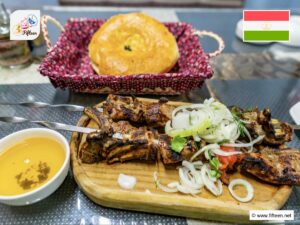
Grilled Dishes
Pair grilled dishes like shashlik (meat skewers) with ayran, a yogurt drink that balances the meat’s richness. Apricot or cherry kompots add a sweet contrast, this pairing is influenced by the drinks of Russia. Green tea, often served in small cups, offers a soothing finish.
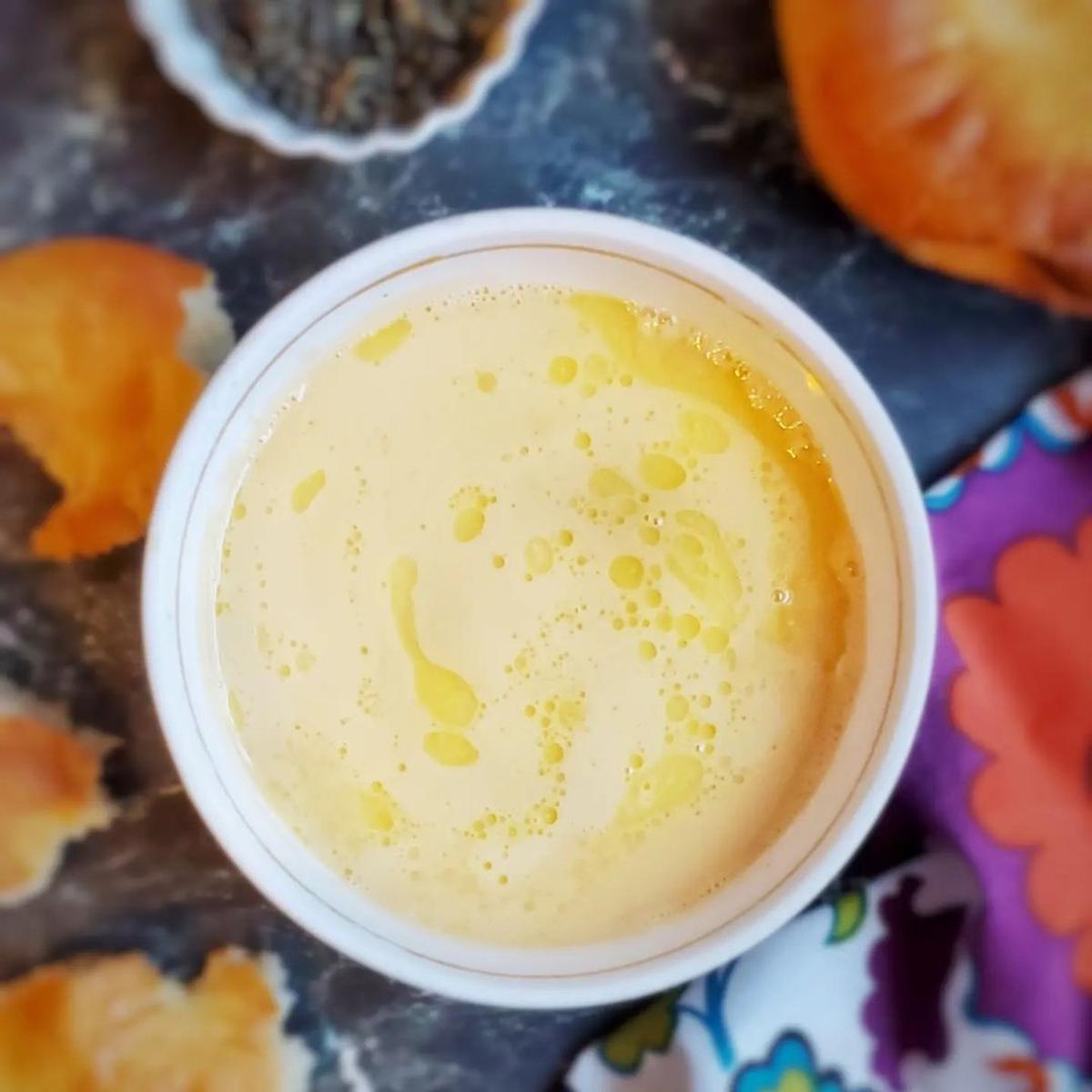
Soups
Enjoy shurbo (meat and vegetable soup) and mastoba (rice and meat soup) with hot green tea to aid digestion. Lightly sweetened black tea with lemon is also refreshing. Additionally, kefir provides a creamy contrast.
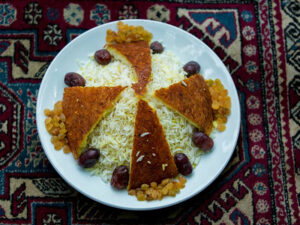
Rice Dishes
Serve plov (pilaf) with pomegranate juice for a tart sweetness and herbal teas like thyme or mint for a fragrant touch.
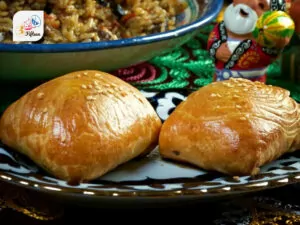
Pastries and Breads
Pair sambusa (meat-filled pastries) and non (traditional bread) with robust black tea, a traditional steeming from the Azerbaijani drinking scene. Fresh apricot juice provides a sweet balance to these savory treats.
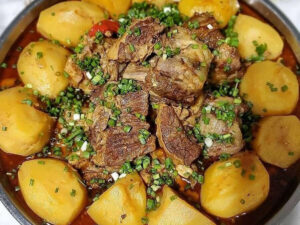
Stews and Meat Dishes
Complement stews like qurutob (bread and yogurt dish) and dimlama with ayran. Green tea, a staple in Tajik traditions, adds a calming note, and wine can add warmth and depth.
By considering these pairings, you can enhance the dining experience and appreciate the flavors of Tajik delicacies more fully.
Have you ever tried a Tajik drink? If not, now’s the perfect time to explore! Share your thoughts in the comments and check out other beverages from different cultures on the website.




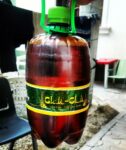
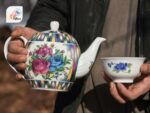
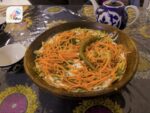





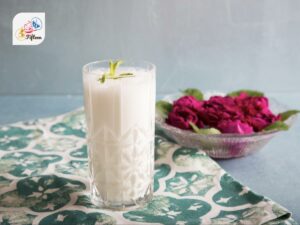
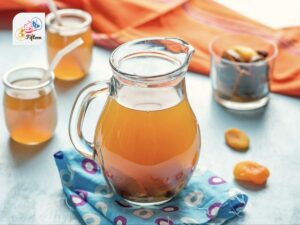
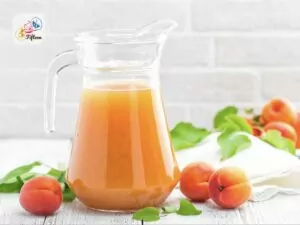
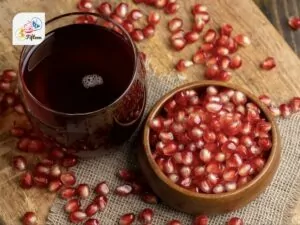
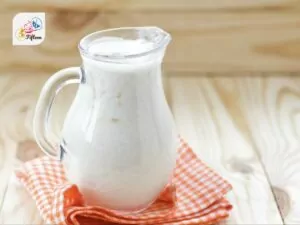

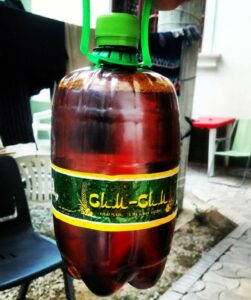
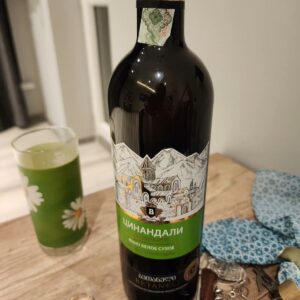
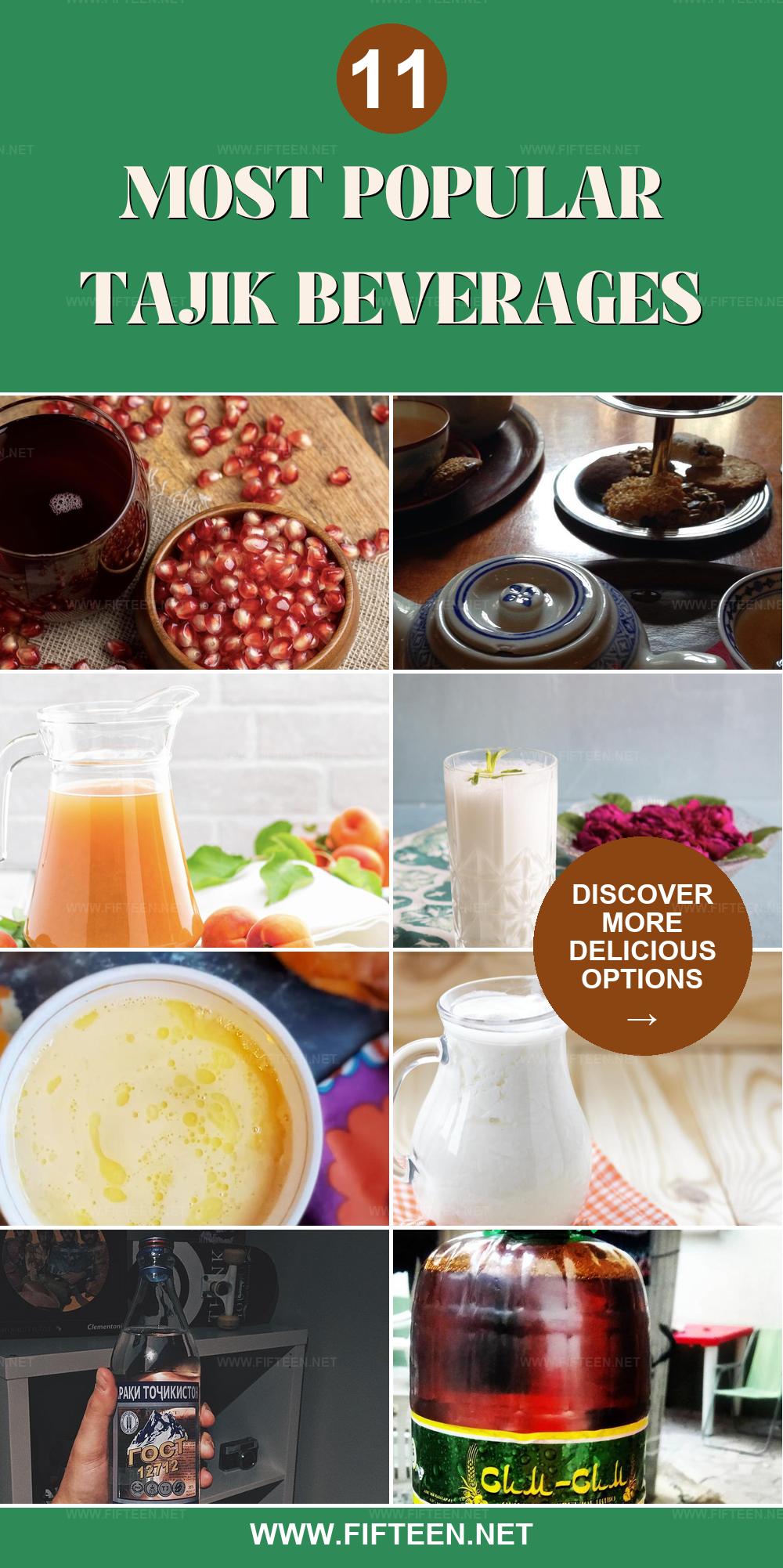
Jamie Scott
Editor in Chief, Senior Content Writer
Expertise
Home Cooking, Meal Planning, Recipe Development, Baking and Pastry, Food Editor, Cooking-video Maker, Western Food Evaluation Expert
Education
Le Cordon Bleu College of Culinary Arts
Local Community College, New York, NY
Jamie Scott is a skilled culinary expert and content creator specializing in Western cuisine. With over 15 years in the culinary field and formal training from Le Cordon Bleu, Paris, Jamie deeply understands how to blend nutrition with delicious flavors. His passion for cooking matches his commitment to making healthy eating accessible and enjoyable.
On Fifteen.net, Jamie brings a fresh perspective to classic dishes and beverages, offering readers insightful recipes, cooking tips, and a fresh view on meal planning that emphasizes taste, health, and simplicity.